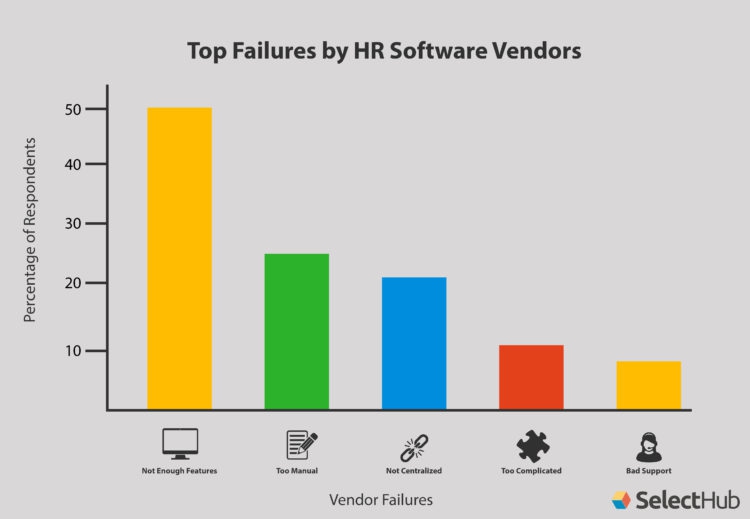Here are the most common five areas where HR software solutions lag behind and which can make HR software buyers look elsewhere for their requirements
Technology in HR has advanced rapidly over the last decade and much more in the last few years, with SMAC—social, mobile, analytics and cloud— integrated solutions. This tremendous evolution has also immensely transformed the roles of HR , making it a strategic and highly-valued function. It can also, in some way, help HR combat its perceived image — that of a cost-centre. However, if HR software is not invested in cautiously and calculatedly, HR may continue to be a cost centre instead of an inevitable and value-adding function.
A survey by SelectHub revealed the five common areas where HR software solutions lag behind, and which can make HR software buyers look elsewhere for their requirements. Clearly, there are a few specific requirements that HR management software vendors fail to provide in the existing systems, making their buyers scout for solutions that match their expectations and needs.
Lack of features
The survey reported that 50 per cent of the respondents said that lack of features was one huge area, where most vendors need to improve. It is the most common reason for buyers to be in the market hunting for a new HR system.
Still too manual
In times when everything is expected to get automated and when jobs are at risk with AI taking over, it is saddening that a lot of existing HR management software solutions are still too manual. 25 per cent of the survey respondents also complain of the same, making it the second most impacting failure.
Scattered tools
Coming in as the third failure, HR systems not being centralised is another huge concern as 21 per cent of the respondents agreed to it. Integration in the current times is a necessity as scattered systems can slow down work and make things more complicated for the end-users or the employees of an organisation, rather than simplifying everything.
Complicated tools
What’s still manual or scattered across platforms would certainly be complicated. 11 per cent of the respondents in the survey admitted that it was one of the areas where HR software vendors failed to help. HRKatha had asked a few HR Heads what they expected from HRMS, and one of them had mentioned that most of the times organisations need to tie up with knowledge partners so as to fully utilise the systems.
Bad support
Eight per cent of the respondents agree that post-implementation and maintenance or usage support is also where a lot of existing solutions fall short.
In addition, the other two factors that made HR software solutions failures were that they were unreliable/buggy (seven per cent) and too expensive (three per cent).
All the failures mentioned here are actually connected in some way. Being too manual certainly indicates not having enough features. Also, a system not being centralised implies that the HR solution does not offer every critical feature in a single location, which makes it a challenge for HR buyers looking for an all-in-one remedy.



